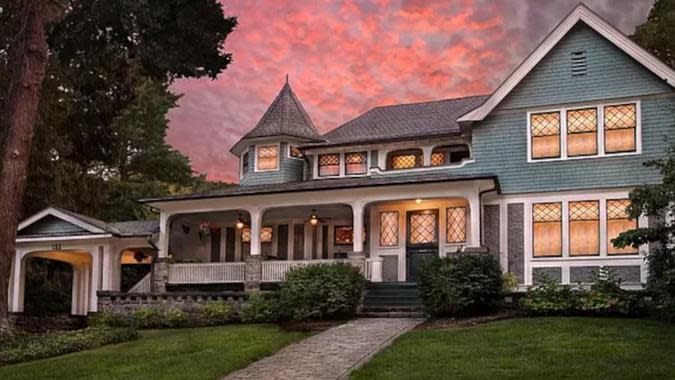7 Things You’ll Regret Downsizing in Retirement

People often downsize in preparation for their retirement years. The goal could be to save money on things like property taxes, home maintenance, travel, luxury, hobbies, and plenty of other expenses. Or it could be to simplify their lifestyles and free up some time.
Read Next: Cutting Expenses in Retirement: 6 Stores To Stop Buying From
Learn More: One Smart Way To Grow Your Retirement Savings in 2024
If you’re thinking about downsizing for any reason, take some time before getting started. Some Otherwise, you might end up getting rid of something you’ll later regret.
Here’s what people often regret downsizing in retirement.

Home or Living Space
One of the first things that comes to mind when you hear the word “downsizing” is probably selling your home for a smaller one. A smaller home comes with lower expenses — particularly in property taxes and insurance — and less maintenance and cleaning.
But you shouldn’t necessarily make your decision based on cost alone. Other factors can affect your quality of life during retirement.
Check Out: 7 Bills You Never Have To Pay When You Retire
Learn More: 7 Unusual Ways To Make Extra Money (That Actually Work)
“This may sound obvious, but the biggest regret I hear about clients who downsize is the lack of space,” said Bob Peterson, senior wealth advisor at Crescent Grove Advisors. “This can pop up in several ways… Lack of your own space/privacy within your own home, lack of space for hobbies/personal projects, and loss of functionality (i.e., going from having a separate home office to the new home office/spare bedroom/storage room/craft room!).”
Before you get rid of your home, make sure the new place still has what you want and need.

Personal Possessions
A lot of retirees will get rid of sentimental items like family heirlooms or other meaningful belongings to declutter. It’s not necessarily a bad idea to toss out a few duplicate photos or broken pieces you no longer care about.
But get rid of too much and you might end up regretting it, especially if you made the decision based primarily on your finances.
“Far too much time is spent in personal finance on purely financial goals instead of balancing your financial and psychological goals,” Peterson said.
Downsizing with only finances in mind can have a major impact on your emotional well-being — especially if it means selling, donating or throwing out the things that bring nonmonetary value to your life.
Discover More: How To Retire on $2,000 a Month: A Frugal Living Guide
This is also a common issue with retirees who move into a smaller home during retirement.
“When moving into a smaller home, items have to be sorted and edited. Keeping only a selection that fits into the new space means letting go of many pieces of furniture that were prized possessions,” said Brenda Scott, owner of Tidy My Space and a professional organizer focused on helping seniors downsize.
“Many clients feel sad and often angry because the items had taken them a while to save up to purchase and had great value to them,” Scott continued. “Finding out that they bought solid wood furniture for thousands of dollars and when selling it online gets them maybe $50, it hurts their pride and they feel like people are disrespecting them.”

Social Aspects or Commitments
“Something I have noticed in my conversations with [my clients] is the regret in downsizing their social circles and commitments too drastically,” said True Tamplin, CEPF and founder of Finance Strategists.
“In anticipation of a quieter life, some retirees cut back on clubs, memberships, or social activities,” Tamplin continued. “Later, they might find themselves feeling isolated or missing the community and connections those activities provided. Actually, keeping engaged with a broader social network can enrich retirement far more than the time and money saved by cutting back.”

Location
Many retirees move when they retire. Some want to be closer to their children or grandchildren or better medical facilities. Others want a lower cost of living.
Whatever the reason, if you’re not ready to go, relocating can come with quite a bit of regret. Not only can selling your home be traumatic, but it could also mean cutting ties with the community you’ve created for yourself.
That’s why it’s important to consider not just the financial or practical side of relocating, but also the emotional.
“If your new home is located at a distance from the place you’re selling, what about your community? Will you still be able to enjoy the relationships with friends and neighbors that you’ve built over the years?” said Jim Davis, CFP and senior wealth advisor at Aspen Wealth Management.
“Maintaining social ties is a significant ingredient of a satisfying retirement lifestyle,” he continued. “Before you move into a new place, consider whether it will support this vital aspect of your life.”

Outdoor Space
Do you own a home with a decent amount of land? If so, ask yourself if you’re OK with giving up that outdoor space to downsize into something smaller or more manageable.
Read More: 10 Best (and Worst) Places To Retire If You Have No Savings
Many apartments and smaller homes don’t have the space for a private yard or a garden. So, if this is something you enjoy, losing that space could be something you end up regretting later.

Independent Living Space
If you’re thinking about moving into a senior community or shared living space, make sure it’s what you really want — and need — before doing so. You might gain an ease of living by having a smaller home, more convenient amenities or personal care. But you’re also giving up a certain degree of independence and privacy.
“If you live in a free-standing home, you typically have a buffer between your neighbors, which you may not fully appreciate,” Peterson said. “If your new home is on a smaller lot, in a planned community, or in a condo/townhome, you suddenly have a whole bunch of new neighbors you may not want.”
Community-based living spaces can be even more stifling if you’re used to having a lot more privacy. This is especially true of smaller or more populated communities that have a lot of shared areas.

Travel and Other Hobbies
Retirement is when people typically have the most time to travel or pursue other hobbies and interests. But if you downsize your budget for these things, or cut them out altogether, you’re going to miss out on a lot of potential opportunities — and that’s something you might well regret.
More From GOBankingRates
This article originally appeared on GOBankingRates.com: 7 Things You’ll Regret Downsizing in Retirement
